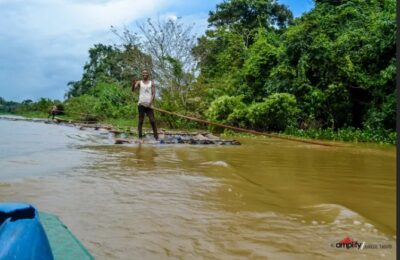Who is Nigeria’s Minister of Water Resources?
Prof. Joseph Utsev is the incumbent Minister of Water Resources and Sanitation in Nigeria.
The working of the Federal Ministry of Water Resources
Clean and accessible portable is one of the critical areas of the UN Sustainable Development Goals and Nigeria can only achieve this through its Ministry of Water Resources
Since 2015 till date, those who are closely monitoring the programmes of the Buhari-led government would know that a few bold steps have been taken to achieve the UN goals.
Some of the initiatives of the ministry include:
- Water Resources Roadmap
- Water Resources Bill
- National Water Resources Policy
- National Irrigation & Drainage Policy
But are the millions of Nigerians who depend on either borehole or river near their homes (in the villages) feeling the impact of the Federal Ministry of Water Resources?
Core Mandates:
To develop and implement policies that will make Nigerians have access to clean and safe water at all times.
Challenges of Water Resources Ministry
Over time, several policies were drafted and approved for implementation by the ministry of water resources to make water available to millions of Nigeria most especially in rural areas.
But the merger, split, scrapping, and restructuring of the ministry lead to the abandonment of such water policies.
For instance, the ministry at various times was merged with the Ministry of Agriculture and Rural Development. Thanks to former President Goodluck Jonathan who made water resources an independent ministry during his administration.
Agencies:
To achieve its core mandate, the Water Resources ministry have 16 agencies, four of which are research institute while 12 is river basin authorities
They are:
| Nigeria’s Ministry of Water Agencies/River Basin Authorities | Year of Establishment |
| Gurara Dam Management Agency (GDMA) | 2009 |
| Ogun-Osun River Basin Development Authority (OORBDA) | 1976 |
| Niger Delta River Basin Development Authority (NDBDA) | 1976 |
| National Water Resources Institute (NWRI) | 1979 |
| Anambra-Imo River Basin Management Authority (AIRBDA) | 1976 |
| Upper Benue River Basin Development Authority | 1976 |
| Benin-Owena River basin Development Authority | 1976 |
| Upper Niger River Basin Development Authority | 1977 |
| Lower Benue River Basin Development Authority (LBRBDA) | 1976 |
| Nigeria Hydrological Services Agency (NHSA) | August 2010 |
| Nigeria Integrated Water Resources Management Commission (NIWRMC) | May 2007 |
| Chad Basin River Basin Development Authority | |
| Sokoto-Rima River Basin Development Authority | 1976 |
| Cross River River Basin Development Authority | 1976 |
| Hadejia Jama’are River Basin Development Authority | 1976 |
| Lower Niger River Basin Development Authority (LNRBDA) | 1994 |
Note: There are 12 river basin development authorities in Nigeria
Roles of the agencies of Nigeria’s Ministry of Water Resources
Gurara Dam Management Agency (GDMA)
To regulate the reservoir water use for sustainable water supply.
Ogun-Osun River Basin Development Authority (OORBDA)
To develop and manage the water resources potential of Osun, Oyo, Ogun and Lagos State
Niger Delta River Basin Development Authority (NDBDA)
To develop water resources to boost agricultural productions to support irrigable crops
National Water Resources Institute (NWRI)
To train stakeholders in water resources and management
Anambra-Imo River Basin Management Authority (AIRBDA)
To provide access to safe and adequate water for domestic, industrial use and to promote socio-economic development of Nigeria
Benin-Owena River basin Development Authority
To undertake comprehensive development of both surface and underground water resources for multipurpose use in Nigeria
Lower Benue River Basin Development Authority (LBRBDA)
To develop water resources potential of Nigeria for agricultural, domestic and industrial uses.
Nigeria Hydrological Services Agency (NHSA)
To provide vital hydrological data needed water resources assessment and quality
Nigeria Integrated Water Resources Management Commission (NIWRMC)
To regulate water resources development, planning and Management.
Sokoto-Rima River Basin Development Authority
To coordinate various projects under the Sokoto Rima and Middle Rima River Basins.
Cross River River Basin Development Authority
To help develop water resources and control flood and erosion in Cross River and Akwa Ibom States
Lower Niger River Basin Development Authority (LNRBDA)
To develop surface and underground water resources potentials of Nigeria for agricultural use in the area of irrigation.
Past Ministers of Water Resources:
- Mohammed Bello Kaliel: 1999 – 13 June 2001
- Muktar Shagari: 13 June 2001 – 10 January 2007
- Ahmed Bello: January 2007 – May 2007
- Sarah Reng Ochekpe: 12 July 2011 – 29 May 2015
- Suleiman Hussein Adamu: 11 November 2015– May 29, 2023
- Joseph Utsev: August 16, 2023-till date
Address:
The ministry is located at Block A1, A2, Federal Secretariat Complex, Area One, P.M.B 159, Garki, Abuja.
- Official website: waterresources.gov.ng
- Email: info@waterresources.gov.ng
Solving The Problem of Access To Clean Water in Nigeria
Nigeria’s Federal Ministry of Water Resources could generate billions of naira in revenue to the Federation Account through Nigeria Integrated Water Resources Management Commission if it can clearly define the roles of NIWRMC.
Despite the fact that millions of homes have boreholes, yet it’s very expensive for some people to bear. As such, the ministry could partner with the private sector that will be supplying clean and potable water to homes in Nigeria.
There used to be Water corporations in most of the state governments in Nigeria at the time, but most of them have now collapsed or functioning below capacity.
Private sectors just like we’ve seen in the telecommunication industry can solve the problem of scarcity of portable, clean, and safe water for millions of Nigerians across the country.
The Ministry of Water Resources should extend its mandate beyond the Federal Capital Territory, it needs to collaborate more with the Ministry of Agriculture at delivering good irrigation to farmers in Nigeria for economic development.


